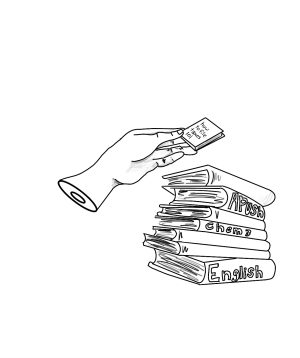Young love: How to combat changes in society
April 28, 2023
“Euphoria” season one, episode four shows the main character, Nate Jacobs, enraged as he throws his girlfriend, Maddy, up against a trailer for what he believes to be disrespectful actions. He leaves her to cover up a neck full of choke marks. Yet, among young fans of “Euphoria,” Nate remains “hot.” Teens of Generation Z have been faced with many changes in society that have altered their habits when it comes to relationships. Media, divorce rates in parents and “hook-up culture” are all contributing factors to the decline of formal dating among teens and their inability to foster healthy relationships.
Media
With the routine use of media including film, music, and social media, adolescents have been exposed to mature topics that may sway their understanding of healthy relationships. According to the Association for Psychological Science, many teens watch movies to determine “sex scripts” that provide examples of how to behave when faced with difficult situations. For 57 percent of 14 to 16-year-old American teens, media such as film and music is the main source of information about sex. As a result, many cannot distinguish between what they see on the screen and what they have to do in their daily lives. In shows like “Euphoria,” which gained widespread popularity among young adults, viewers become invested in the characters and disturbing plot lines. Even though the series was originally dedicated to the realistic portrayal of these sensitive topics, it hasn’t stopped young fans from becoming infatuated with the unrealistic lives and circumstances of the characters.

Other forms of media also show similar effects on teenagers. Misogynistic influencers appear to offer boys and young men a “solution” to what they perceive as gender oppression caused by the rise of feminism, and their own feelings and experiences. Andrew Tate, a popular influencer, developed his image through viral rants about male dominance and female submission, attempting to legitimize and fuel male grievances and resentments against women. A study published in the Journal of Social and Personal Relationships found that exposure to objectifying media, such as music videos or images portraying women as sexual objects, can lead to men’s increased aggression towards women. The study also found men who were exposed to this were more likely to view women as inanimate rather than individuals with their own thoughts and feelings.
A teen may say their life is inside their phone. While this increased use of technology can provide opportunities for communication and connection, it can also contribute to negative emotions and behaviors harmful to relationships. Feelings of jealousy within teen relationships have been uprooted by social media. According to the Journal of Youth and Adolescence, frequent social media use is associated with increased jealousy and decreased relationship satisfaction among teens. Social media also contributes to less face-to-face communication in teen relationships, which can impede the development of intimacy and trust. The lack of real-life connections can produce a sense of comfort that comes with hiding behind a screen when conversing. This may be connected to the absence of active dating in today’s society, because new fears in social interactions are established habitually within the digital world.
Hook-up Culture
Generation Z has been acknowledged for the contemporary culture of “hooking-up.” Hook-up culture supports casual sexual relationships that exclude emotional intimacy and commitment. Hook-up culture can be linked with the sexual empowerment of women due to its perceived acceptance to explore their sexuality on their own terms, as well as its challenge towards traditional gender roles and stereotypes. However, it has many negative effects on men and women and can obstruct the development of a strong relationship. According to the American Psychology Association, a survey of 1,468 students regarding casual hook-ups showed that 83 percent of participants reported negative emotional and mental consequences involving embarrassment, loss of respect for oneself and from others and difficulty maintaining steady relationships. While women are often assumed to be the victims of hook-up culture, men are also often affected by casual sexual encounters. A clinical psychologist and school consultant, Catherine Steiner-Adair, interviewed 1,000 students nationwide for her new book, The Big Disconnect: Protecting Childhood and Family Relationships in the Digital Age.
“[It’s] insufficient, superficial and polarizing when boys simply get cast as aggressors and girls as victims,” Steiner-Adair said.

These negative stereotypes of men and women involving hook-up culture further disturb a healthy foundation of personal romantic relationships in teens. These behaviors may also mask one’s true feelings. In the documentary Liberated, which introduces the topic of pop culture changing how we view gender and sexuality, Dr. Caroline Heldmen shares her beliefs of women giving into objectification, which they mask as feeling empowered.
“Women believe that being a sex object is empowering because it makes them feel as though they are wanted and desired. But the idea that our bodies are our value means that we are forever dependent on men to validate us. We are dependent on an outside source to say that we are important, to say that we are valuable,” Heldmen said.
Objectification can lead women to lean away from genuine connections in romantic relationships, but the trend of hookup culture that opposes dating between teens can also be linked to the relationship modeled to them by their parents.
Divorce in Parents
Catherine Cullen, a psychotherapist and author, wrote in Psychology Today about the effects divorce may have on children.
“Children [with divorced parents] may be less comfortable with closeness, more avoidant of others and have less secure attachment styles than those who did not experience a divorce,” Cullen said.
A study regarding the effects of parental divorce and its influence on romantic beliefs at the University of North Texas supports Cullen’s theory by correlating individuals with divorced parents and fearful, avoidant romantic attachment styles. Dr. Kate Balestrieri, a licensed psychologist elaborated on attachment styles and how they can affect romantic relationships.
“Those with fearful-avoidant attachments want love from others. They may even crave affection. But, at the same time, they are reluctant to have close or intimate relationships,” Balestrieri said.
This attachment style may manifest in behaviors such as clinginess, negativity, avoidance, lashing out, control and violence.
Developing Healthy Relationships

While romantic relationships can be both rewarding and challenging, it is important to understand the signs of healthy and unhealthy relationships. The One Love Foundation is a nonprofit organization aimed at teaching young people the signs of both healthy and unhealthy relationships. One Love provides specific examples of positive romantic behaviors like demonstrating accountability and respect — in contrast to negative romantic behaviors — i.e. engaging in manipulation and possessiveness.
One Love’s dedication to teaching the world about encouraging versus damaging behaviors can be applicable towards all types of relationships: romantic partners, friends, colleagues, peers or parents. According to one love, a strong relationship will ensure that your instincts give you the green light, you can be yourself around them, you are able to express your boundaries, you enjoy your time together, and the condition of your relationship allows for personal growth.
While these components are important for a thriving bond between two people, it is expected that some relationships may not provide as much of a beneficial reward system. Most importantly, if you or someone you love are experiencing abuse, take action by educating yourself and others about the warning signs of unhealthy actions in a relationship, and the signs of an abusive partner.







